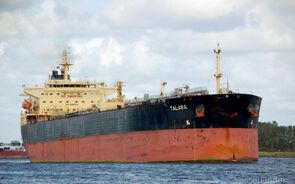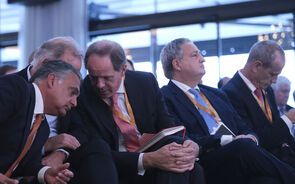Dados pra hoje ...
paubo Escreveu:ve isto:
http://www.fxwords.com/w/wholesale-inve ... tates.html
Pois... é como eu pensava.
Obrigado, paubo
- Mensagens: 247
- Registado: 10/2/2009 20:03
- Localização: Vila Nova de Gaia
Será esta
Dec. 8 (Bloomberg) -- Emerging-market stocks fell, with the MSCI’s gauge of developing nations’ equities posting its longest losing streak in five weeks, as rating companies highlighted the risk of government deficits. Dubai shares led the decline, dropping to the lowest level in almost five months. The yen rose.
The MSCI Emerging Markets Index lost 0.2 percent at 10:14 a.m. in London, Dubai’s DFM General Index plunged 6.5 percent and Abu Dhabi’s index slumped 3.3 percent. The yen rose against all 16 most-traded currencies. Futures on the Standard & Poor’s 500 Index fluctuated between gains and losses.
Moody’s Investors Service said today deteriorating public finances in the U.S. and U.K. may “test the Aaa boundaries.” Standard & Poor’s said it may cut Greece’s rating for a second time this year. U.S. Federal Reserve Chairman Ben Bernanke told the Washington Economic Club yesterday that the U.S. economy faces “formidable headwinds,” while Japan’s government unveiled a stimulus package worth 7.2 trillion yen ($81 billion).
“Central banks and governments around the world are totally right in saying that the recovery is still very weak,” Philippe Gijsels, a senior structured product strategist at Fortis Global Markets in Brussels, said in an interview with Bloomberg Television. “Going into 2010 I would be extremely surprised if we do not see a serious hiccup somewhere.”
Greece, Ireland, Portugal
The MSCI World Index of 23 developed nations’ stocks was little changed, after earlier losing 0.2 percent. Europe’s Dow Jones Stoxx 600 Index fluctuated between gains and losses as benchmark indexes in Greece, Ireland, Portugal and Iceland declined. Tesco Plc retreated 1.9 percent in London after reporting slowing sales growth that missed analysts’ estimates as food-price inflation cooled.
The MSCI Asia Pacific Index gained 0.2 percent. Nintendo Co., the world’s biggest game maker, gained 1.4 percent in Tokyo after a market researcher said the company posted record sales of its new Super Mario Bros. title. Canon Inc., which gets 28 percent of its revenue from the Americas, declined 1.1 percent. Tokyo Tatemono Co. tumbled 8 percent after shareholders cut their stakes in the developer.
The gain in U.S. futures indicated the S&P 500 may reverse yesterday’s 0.3 percent loss. FedEx said late yesterday its earnings will be $1.10 a share for the period ended in November. The stock climbed 1.9 percent in German trading.
Dubai Slumps
The benchmark gauge for U.S. equities has surged 63 percent since March 9, the steepest advance since the Great Depression, spurred by record-low interest rates and $12 trillion committed by governments worldwide. The measure is valued at 22.2 times the reported operating earnings at its companies from the past year, the most expensive level since 2002, according to data compiled by Bloomberg.
Dubai shares fell the most among benchmark indexes tracked by Bloomberg, extending a 22 percent slide since the government said on Nov. 25 that it was seeking a “standstill” agreement on Dubai World’s debt. The company last week began talks with banks to restructure $26 billion of debt, including a $3.52 billion Islamic bond of property unit Nakheel PJSC due to be repaid on Dec. 14.
The ruble weakened 1.3 percent against the dollar, extending its steepest three-day slump in five months, after Finance Minister Alexei Kudrin said Russia remained a “weak link” in global finance. South Africa’s rand traded 0.8 percent weaker.
Pound Tumbles
The yen strengthened 0.7 percent against the dollar to 88.88 and 0.6 percent to 131.90 per euro. The dollar dropped 0.2 percent against the euro. Japan’s currency gained the most against the pound, adding 1.2 percent to 145.48, after Moody’s said the U.K. faces an “inexorable deterioration of debt affordability.” The pound fell 0.6 percent against the euro and 0.5 percent versus the dollar.
Bernanke reaffirmed the Fed’s intention to keep interest rates low for an “extended period.” Japan said its stimulus package will help counter “a deterioration in employment conditions” and “sluggish demand because of deflationary pressure.”
Greek bonds tumbled, pushing the yield on the 10-year note up 11 basis points to 5.24 percent. The difference in yield with German bunds widened to 206 basis points, the most since May 4. S&P yesterday placed Greece’s A- sovereign credit rating on watch for a possible downgrade, while European Central Bank President Jean-Claude Trichet said Greece is facing a “very difficult” situation and needs to take “courageous” decisions to counter the budget deficit.
Copper Gains
Copper led gains in industrial metals, advancing 1.2 percent to $7,080 a metric ton in London. Aluminum rose 1.1 percent and zinc 1.6 percent. Crude oil added 0.1 percent to $74 a barrel in New York trading. Gold for immediate delivery rose 0.2 percent to $1,159.90 an ounce in London.
The Bank of Korea said today that there’s “an illusion in gold,” and that adding to gold holdings isn’t attractive as most other central banks aren’t buying and the metal offers no cash returns.
The MSCI Emerging Markets Index lost 0.2 percent at 10:14 a.m. in London, Dubai’s DFM General Index plunged 6.5 percent and Abu Dhabi’s index slumped 3.3 percent. The yen rose against all 16 most-traded currencies. Futures on the Standard & Poor’s 500 Index fluctuated between gains and losses.
Moody’s Investors Service said today deteriorating public finances in the U.S. and U.K. may “test the Aaa boundaries.” Standard & Poor’s said it may cut Greece’s rating for a second time this year. U.S. Federal Reserve Chairman Ben Bernanke told the Washington Economic Club yesterday that the U.S. economy faces “formidable headwinds,” while Japan’s government unveiled a stimulus package worth 7.2 trillion yen ($81 billion).
“Central banks and governments around the world are totally right in saying that the recovery is still very weak,” Philippe Gijsels, a senior structured product strategist at Fortis Global Markets in Brussels, said in an interview with Bloomberg Television. “Going into 2010 I would be extremely surprised if we do not see a serious hiccup somewhere.”
Greece, Ireland, Portugal
The MSCI World Index of 23 developed nations’ stocks was little changed, after earlier losing 0.2 percent. Europe’s Dow Jones Stoxx 600 Index fluctuated between gains and losses as benchmark indexes in Greece, Ireland, Portugal and Iceland declined. Tesco Plc retreated 1.9 percent in London after reporting slowing sales growth that missed analysts’ estimates as food-price inflation cooled.
The MSCI Asia Pacific Index gained 0.2 percent. Nintendo Co., the world’s biggest game maker, gained 1.4 percent in Tokyo after a market researcher said the company posted record sales of its new Super Mario Bros. title. Canon Inc., which gets 28 percent of its revenue from the Americas, declined 1.1 percent. Tokyo Tatemono Co. tumbled 8 percent after shareholders cut their stakes in the developer.
The gain in U.S. futures indicated the S&P 500 may reverse yesterday’s 0.3 percent loss. FedEx said late yesterday its earnings will be $1.10 a share for the period ended in November. The stock climbed 1.9 percent in German trading.
Dubai Slumps
The benchmark gauge for U.S. equities has surged 63 percent since March 9, the steepest advance since the Great Depression, spurred by record-low interest rates and $12 trillion committed by governments worldwide. The measure is valued at 22.2 times the reported operating earnings at its companies from the past year, the most expensive level since 2002, according to data compiled by Bloomberg.
Dubai shares fell the most among benchmark indexes tracked by Bloomberg, extending a 22 percent slide since the government said on Nov. 25 that it was seeking a “standstill” agreement on Dubai World’s debt. The company last week began talks with banks to restructure $26 billion of debt, including a $3.52 billion Islamic bond of property unit Nakheel PJSC due to be repaid on Dec. 14.
The ruble weakened 1.3 percent against the dollar, extending its steepest three-day slump in five months, after Finance Minister Alexei Kudrin said Russia remained a “weak link” in global finance. South Africa’s rand traded 0.8 percent weaker.
Pound Tumbles
The yen strengthened 0.7 percent against the dollar to 88.88 and 0.6 percent to 131.90 per euro. The dollar dropped 0.2 percent against the euro. Japan’s currency gained the most against the pound, adding 1.2 percent to 145.48, after Moody’s said the U.K. faces an “inexorable deterioration of debt affordability.” The pound fell 0.6 percent against the euro and 0.5 percent versus the dollar.
Bernanke reaffirmed the Fed’s intention to keep interest rates low for an “extended period.” Japan said its stimulus package will help counter “a deterioration in employment conditions” and “sluggish demand because of deflationary pressure.”
Greek bonds tumbled, pushing the yield on the 10-year note up 11 basis points to 5.24 percent. The difference in yield with German bunds widened to 206 basis points, the most since May 4. S&P yesterday placed Greece’s A- sovereign credit rating on watch for a possible downgrade, while European Central Bank President Jean-Claude Trichet said Greece is facing a “very difficult” situation and needs to take “courageous” decisions to counter the budget deficit.
Copper Gains
Copper led gains in industrial metals, advancing 1.2 percent to $7,080 a metric ton in London. Aluminum rose 1.1 percent and zinc 1.6 percent. Crude oil added 0.1 percent to $74 a barrel in New York trading. Gold for immediate delivery rose 0.2 percent to $1,159.90 an ounce in London.
The Bank of Korea said today that there’s “an illusion in gold,” and that adding to gold holdings isn’t attractive as most other central banks aren’t buying and the metal offers no cash returns.
- Mensagens: 26
- Registado: 2/12/2009 16:02
- Localização: 24
BULLET: PORTUGAL: Portugal 10-year OT vs German Bund yield...
PORTUGAL: Portugal 10-year OT vs German Bund yield spread has
reversed earlier outperformance and now trading at +53bps vs +51bps pre
S&P Ratings decision to lower Portugal outlook to negative from stable.
Provided by: Market News International
PORTUGAL: Portugal 10-year OT vs German Bund yield spread has
reversed earlier outperformance and now trading at +53bps vs +51bps pre
S&P Ratings decision to lower Portugal outlook to negative from stable.
Provided by: Market News International
dados dos EUA para hoje:
13:30 Change in Nonfarm Payrolls NOV -120K -190K
13:30 Unemployment Rate NOV 10.2% 10.2%
13:30 Change in Manufact. Payrolls NOV -50K -61K
13:30 Average Hourly Earnings MoM NOV 0.2% 0.3%
13:30 Average Hourly Earnings YoY NOV 2.3% 2.4%
13:30 Average Weekly Hours NOV 33.1 33.0
15:00 Factory Orders
13:30 Change in Nonfarm Payrolls NOV -120K -190K
13:30 Unemployment Rate NOV 10.2% 10.2%
13:30 Change in Manufact. Payrolls NOV -50K -61K
13:30 Average Hourly Earnings MoM NOV 0.2% 0.3%
13:30 Average Hourly Earnings YoY NOV 2.3% 2.4%
13:30 Average Weekly Hours NOV 33.1 33.0
15:00 Factory Orders
Algumas consideraçoes de Mr. Trichet na ECB Monthly News Conference :
*U.S. 3Q PRODUCTIVITY UP 8.1%, REVISED FROM 9.5% FIRST ESTIMATE
*TRICHET SAYS ECB RATES ARE `APPROPRIATE'
*TRICHET SAYS VERY IMPORTANT THAT U.S. DOLLAR IS STRONG
*TRICHET SAYS TODAY'S INTEREST RATE DECISION WAS UNANIMOUS
*TRICHET SAYS LIQUIDITY ABUNDANT FOR SOME TIME TO COME
*U.S. 3Q PRODUCTIVITY UP 8.1%, REVISED FROM 9.5% FIRST ESTIMATE
*TRICHET SAYS ECB RATES ARE `APPROPRIATE'
*TRICHET SAYS VERY IMPORTANT THAT U.S. DOLLAR IS STRONG
*TRICHET SAYS TODAY'S INTEREST RATE DECISION WAS UNANIMOUS
*TRICHET SAYS LIQUIDITY ABUNDANT FOR SOME TIME TO COME
Quem está ligado:



